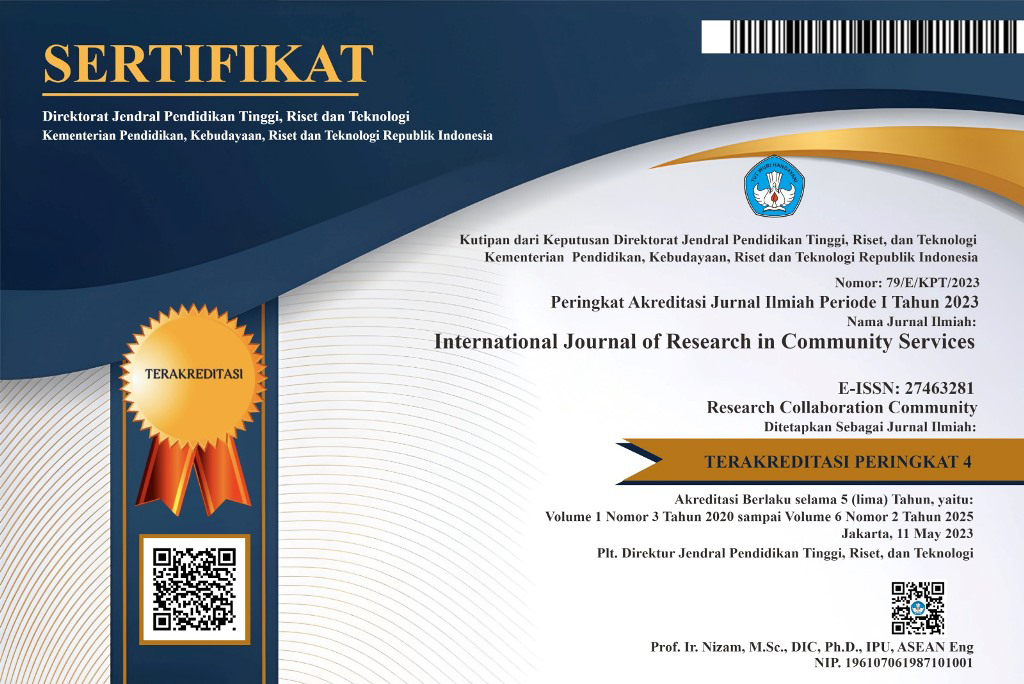Increasing Knowledge About the Impact of Online Games on Health in Sukasenang Village, Tasikmalaya, Indonesia
Abstract
The purpose of this study was to describe the factors causing playing online games and their negative impact on students in Sukasenang Village, Tanjungjaya District, Tasikmaya Regency. The subject of this research is that it consists of students playing online games, SDN 1 Cigowak village Sukasenang. Data collection techniques in this study using observation, interviews, and documentation. The results of this study indicate that the factors that cause playing online games and their negative impact on students at the internet cafe at SDN 1 Cigowak village Sukasenang are visible and real. This is proven by the factors that cause children to play online games, namely (a) less than optimal communication between children and family members, especially parents; (b) Lack of parental supervision of children; (c) Errors in parenting patterns from parents to children; (d) The boredom or boredom of a child will be a monotonous routine. Online games have negative impacts including social impacts, psychological impacts, and physical impacts.
Keywords
Full Text:
PDFReferences
Billieux, J., Maurage, P., Lopez-Fernandez, O., Kuss, D. J., & Griffiths, M. D. (2015). Can disordered mobile phone use be considered a behavioral addiction? An update on current evidence and a comprehensive model for future research. Current Addiction Reports, 2(2), 156-162.
Bonneau, J., & Preibusch, S. (2010). The privacy jungle: On the market for data protection in social networks. In Economics of information security and privacy (pp. 121-167). Springer, Boston, MA.
Boyle, E. A., Connolly, T. M., Hainey, T., & Boyle, J. M. (2012). Engagement in digital entertainment games: A systematic review. Computers in human behavior, 28(3), 771-780.
Douglass, C. B. (2007). From duty to desire: Emerging adulthood in Europe and its consequences. Child development perspectives, 1(2), 101-108.
Feng, S., Wong, Y. K., Wong, L. Y., & Hossain, L. (2019). The Internet and Facebook usage on academic distraction of college students. Computers & Education, 134, 41-49.
Fuchs, O., Bahmer, T., Rabe, K. F., & von Mutius, E. (2017). Asthma transition from childhood into adulthood. The Lancet Respiratory Medicine, 5(3), 224-234.
Ge, X., Conger, R. D., & Elder Jr, G. H. (2001). Pubertal transition, stressful life events, and the emergence of gender differences in adolescent depressive symptoms. Developmental psychology, 37(3), 404.
Kerr, A. (2006). The business and culture of digital games: Gamework and gameplay. Sage.
Lee, Z. W., Cheung, C. M., & Chan, T. K. (2021). Understanding massively multiplayer online role‐playing game addiction: A hedonic management perspective. Information Systems Journal, 31(1), 33-61.
Novrialdy, E., Nirwana, H., & Ahmad, R. (2019). High school students understanding of the risks of online game addiction. Journal of Educational and Learning Studies, 2(2), 113-119.
Rauber, S. B., Boullosa, D. A., Carvalho, F. O., de Moraes, J. F., de Sousa, I. R., Simões, H. G., & Campbell, C. S. (2014). Traditional games resulted in post-exercise hypotension and a lower cardiovascular response to the cold pressor test in healthy children. Frontiers in physiology, 5, 235.
Reed, G. M., First, M. B., Kogan, C. S., Hyman, S. E., Gureje, O., Gaebel, W., & Saxena, S. (2019). Innovations and changes in the ICD‐11 classification of mental, behavioural and neurodevelopmental disorders. World Psychiatry, 18(1), 3-19.
Surbakti, K. (2017). Pengaruh Game Online Terhadap Remaja. Jurnal Curere, 1(1).
Wright, J., & Burrows, L. (2006). Re-conceiving ability in physical education: a social analysis. Sport, Education and society, 11(3), 275-291.
Xu, Z., Turel, O., & Yuan, Y. (2012). Online game addiction among adolescents: motivation and prevention factors. European journal of information systems, 21(3), 321-340.
Young, K. (2009). Understanding online gaming addiction and treatment issues for adolescents. The American journal of family therapy, 37(5), 355-372.
DOI: https://doi.org/10.46336/ijrcs.v2i3.223
Refbacks
- There are currently no refbacks.
Copyright (c) 2021 International Journal of Research in Community Services

This work is licensed under a Creative Commons Attribution 4.0 International License.
Published By:
IJRCS: Jalan Riung Ampuh No. 3, Riung Bandung, Kota Bandung 40295, Jawa Barat, Indonesia
Indexed By:

This work is licensed under a Creative Commons Attribution 4.0 International License.
View My Stats








